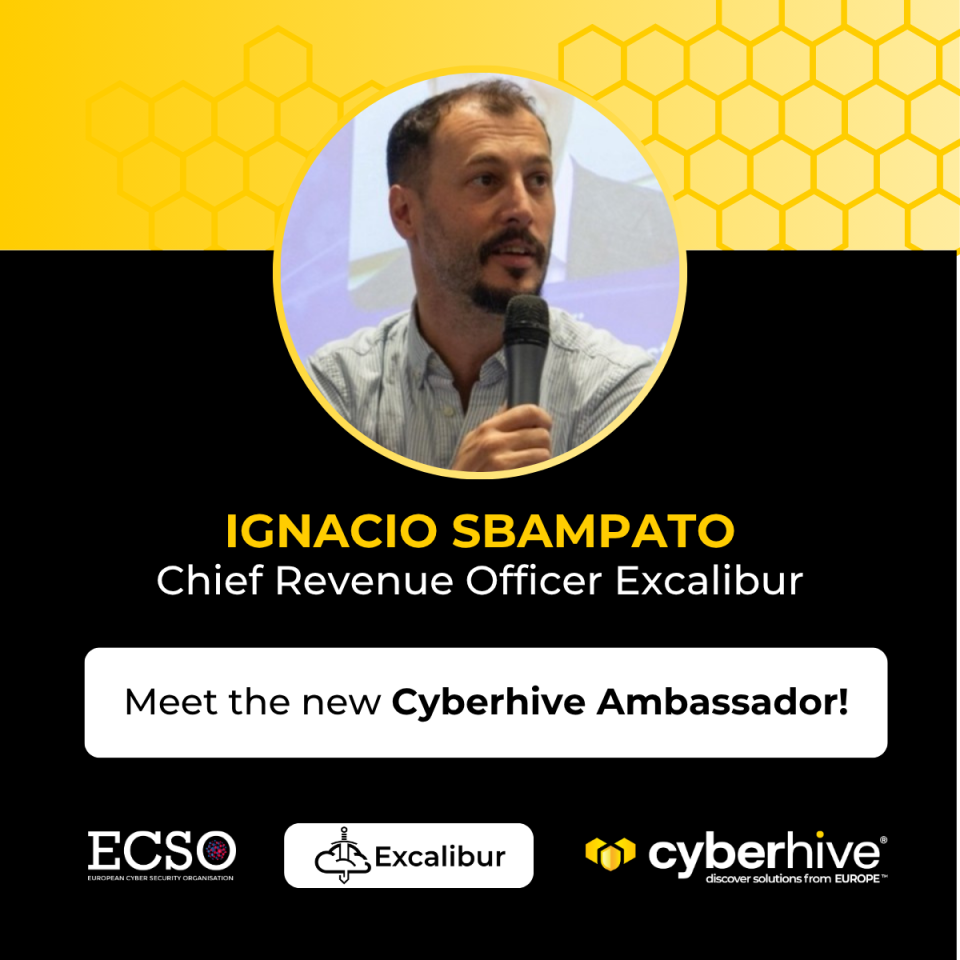Meet the Cyberhive Ambassador Ignacio Sbampato, Chair of the SME2Market Workstream and Chief Revenue Officer at Excalibur!
Ignacio joined the Cyberhive Task Force as a dedicated advocate for European cybersecurity innovation. Ignacio has been since the beginning of the Cyberhive and it was recently appointed as one of the Chairs of the SME2Market Workstream within the European Cyber Security Organisation (ECSO).
With a distinguished background as the former Chief Business Officer at ESET and now Chief Revenue Officer at Excalibur, Ignacio brings deep expertise in global market development. Learn more about his journey, his passion for helping SMEs scale, and why he sees Cyberhive as a key enabler of collaboration, visibility, and strategic growth in the European cybersecurity ecosystem.
Could you briefly describe your career path and current position?
I have been in the cybersecurity industry since I remember, starting in the technical side of things and then moving to commercial activities when I joined ESET in 2004 as a Vicepresident for Latin America.
Since then until 2023, I was part of the successful story of one of the few EU-based cybersecurity vendors that reached hundreds of millions in annual revenue, the last 12 years as the Chief Business Officer.
Currently, I am Chief Revenue Officer at Excalibur, another Slovak cybersecurity company, leading sales and marketing activities, focusing in developing our strategy to promote and sell our Streamed Access Management solution.
Why did you (Excalibur) become a member of ECSO?
Becoming an ECSO member has been key for Excalibur. We are proud of our European roots and joining ECSO is helping us to connect with other companies like ours and strengthen our position in the market as well as participate of the many activities that ECSO is promoting to help SMEs like us.
What would you like to tackle in ECSO to further develop the European security landscape?
European startups and scaleups need access to market. While there are many activities when it comes to funding, policy, etc, the reality is that most of the problems that startups and scaleups have are solved by generating revenue, and that is only possible if they have the chance to present themselves to potential customers.
Many European SMEs are experiencing low growth and barriers to access the market, taking too long to generate the relevant revenue that will help them to become disruptors in their sector. This is where we need to focus more attention.
What are the major challenges we will have to face in the field of cybersecurity in the coming years?
From a pure cybersecurity point of view, I think we can name 3: Skills, Identity & AI.
I am not saying Skills because of the usual claims that there are millions of jobs unfulfilled in cybersecurity. The adoption of automation and AI in cybersecurity processes will have an impact in entry level jobs, as those might be the first ones to be replaced, at least partially, by AI. When that happens, how we are going to have senior cybersecurity experts if there is less entry level positions for them to learn?
Then, we can clearly see how majority of breaches start, or at least involve, exploiting weak credentials or using stolen ones. Improving the Identity and Access Management posture of organizations is still a challenge that is not addressed and will continue to not be fully addressed for some time.
When it comes to AI, the issue is that it lowers the barrier to entry for attackers, making it even easier for them to exploit vulnerabilities and carry on attacks. How we are going to tackle that, remains to be seen.
What role do you think that Cyberhive should play in achieving European strategic autonomy?
The Cyberhive plays a significant role, in my opinion, to help European SMEs to access the market, which I think is the only way to see European leaders in cybersecurity. Becoming a hub where customers, investors and vendors can connect and find each other, will help Europe in many ways, not only in strategic autonomy, but also in seeing successful cybersecurity businesses that can innovate and protect European customers.
From your perspective, how can Europe better support cybersecurity start-ups and scale-ups to foster innovation?
Generating opportunities for them to access potential customers and lowering administrative barriers. We talk about many things in a high-level today and we need practical, simple steps to really start to see change.
What advice would you give to policymakers to ensure Europe stays competitive and secure in the global cybersecurity arena?
Make things simpler, support the local startups and scaleups, and give them a chance to grow and remain European. The word, for me, is simplicity, and if that is applied to everything (from regulations, to access to funding and markets, etc), we will see a thriving ecosystem.



Comments
Do you want to leave a comment?
Login or register to proceed
Login Register